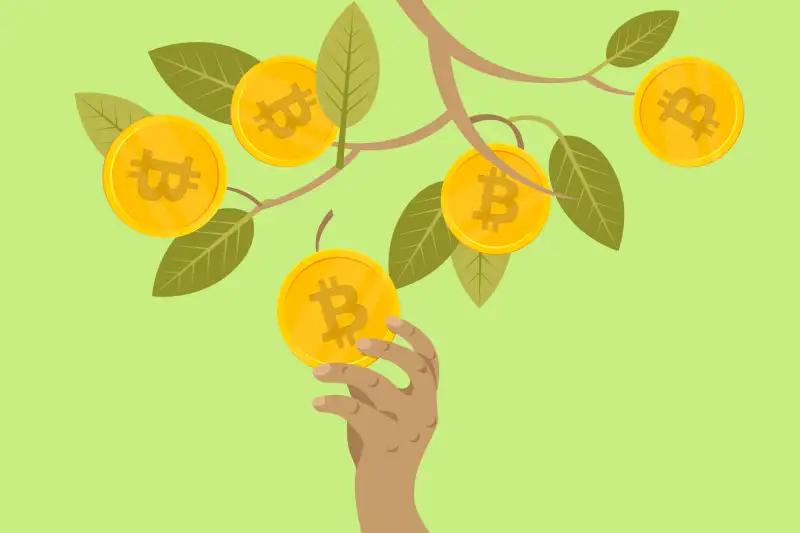Is Bitcoin Safe?
Money is not a client of any investment adviser featured on this page. The information provided on this page is for educational purposes only and is not intended as investment advice. Money does not offer advisory services.

The idea of Bitcoin’s safety is double edged. On the one hand, the Bitcoin market is volatile and unregulated. On the tech side, the keys to access it can be lost or stolen. Still, many people trade the coin despite these risks, whether due to its potentially high return on investment or because they support the idea of decentralized finance.
Read on to learn more about what you should look out for before shelling out for Bitcoin.
- Is Bitcoin a safe investment?
- Is Bitcoin safe from hackers?
- How to secure a Bitcoin wallet
- Is Bitcoin safe FAQ
Is Bitcoin a safe investment?
Bitcoin is a highly speculative investment. Just recently, the price of Bitcoin hit an all-time high of more than $68,000 in November of 2021 before sinking below $42,000 in early January. This is just one instance in the coin’s history of ups and downs.
According to John Griffin, professor of finance at the University of Texas McCombs School of Business, buying bitcoins more closely resembles gambling than investing. “Since the big players are the ones manipulating prices, the small guys get hurt,” he says. “Your odds are probably better in Vegas.”
That said, it’s possible to see a hefty return on a crypto investment. Bitcoin can be sold off quickly and at any time — while the U.S. stock market, on the other hand, only operates during weekday working hours. Those who know how to use Bitcoin can make big purchases, especially when the coin price is high.
Still, it’s far riskier than most investment vehicles.
Ari Juels, professor at Cornell Tech and co-director of the Initiative for CryptoCurrencies and Contracts, suggests that “If you buy any type of cryptocurrency, you need to be prepared to lose your shirt.” He recommends you invest only what you’re willing to lose and take the time to learn all you can about crypto before taking the plunge.
“If you enjoy roller-coasters, you’ll get a similar set of thrills from investing in cryptocurrency,” he says. “I would say that’s a pro or a con, depending on your temperament.”
Crypto’s inherent volatility
Volatility in finance refers to the fluctuations in the price of an asset over time. Like traditional investments, such as stocks and bonds, the value of Bitcoin, Ethereum, and other digital currencies depend on various factors.
Many events can trigger severe fluctuations in the price of an asset: an impending court decision, a news release from a company, or even a tweet from a popular tech guru such as Elon Musk.
Cryptocurrency is an inherently more volatile investment because it’s subject to little regulation and, unlike traditional currencies — like the U.S. dollar — isn't backed by a government, cash flows, or any type of physical asset.
These fluctuations may also lead some to wonder if it’s too late to invest in crypto at all, and Bitcoin is no exception to this. Since being introduced in 2009 at a price of $0, Bitcoin has seen soaring highs and crushing lows throughout its 13-year lifespan.
In 2011, when the coin was still young, it rose from $2 to more than $32 and then crashed in a single day to a penny’s worth after a massive hacking attack on Mt. Gox, the then-largest Bitcoin exchange.
Mt. Gox would later shut down in April 2013 after a growing volume of trades crashed the exchange and opened it up to another major hacking attack, which sent the coin’s price from nearly $260 to $50. Then, after peaking in 2017 at $20,000, the price careened back down below $12,000 and struggled to recover amid major hacks in Korea and Japan.
Experts link the value of coins to short-term drivers like demand and how willing investors are to take a risk. “It’s popular because it’s gone up, and people have made money,” says Griffin. “Anytime something increases in value, it gains friends."
Is Bitcoin safe if you lose your keys or hard drive?
One big concern with investing in Bitcoin is the danger of losing it — or, more accurately, losing access to it. Consider the story of James Howells, a Welshman who accidentally discarded a hard drive with the access key to eight thousand Bitcoin, which had grown to a value of $533,963,174 in December 2021. Was there no way of recovering these coins?
Traders interact with their Bitcoin on the blockchain via a public key and a private key. Keys are a string of letters and numbers used to locate and access your Bitcoin. Your private key is what’s relevant here: in most cases, losing it means your Bitcoin may be missing forever.
If you’re holding your Bitcoin in a wallet service hosted by an exchange, the exchange holds this private key. While this ensures you won’t lose it, it does create a security vulnerability. If the exchange were hacked, your key (and countless others) might be revealed.
If you’re holding your Bitcoin in an independent crypto wallet, you’re responsible for your private key. For software wallets, you’ll need to keep your key written down somewhere safe, and for hardware wallets, your key is provided by the device itself.
You can’t really “lose” your key to wallets provided by crypto exchanges, only your password (which can be reset).
Losing the private key to an independent software wallet is another story. Because the wallet’s developers don’t know what your key consists of, they can’t verify you’re its actual owner, and there’s a good chance you’ll never see your Bitcoin again.
Is Bitcoin safe from the government?
Government crackdowns are another concern for traders engaged in Bitcoin transactions. For example, China started banning financial services and payment companies from carrying out crypto transactions a few months before declaring all cryptocurrency transactions of any kind illegal. In Turkey, the Central Bank has banned the use of cryptocurrencies and crypto assets for making purchases.
It’s hard to say whether other countries will follow suit by imposing severe restrictions on trading cryptocurrencies. However, it’s more likely that we’ll just see additional regulation to protect consumers from losing their money due to scammers and other bad-faith actors.
Is Bitcoin safe from hackers?
Threat of hackers
Bitcoin wallets and exchanges aren’t hack-proof. In 2019, Binance, one of the largest crypto exchanges in the world, was attacked by cybercriminals who stole $40 million worth of bitcoin investments. High-profile hacking incidents have also plagued Liquid and KuCoin, two other major exchanges.
Your bitcoin stash may be especially vulnerable to hacking if you leave it sitting in a digital wallet hosted by a crypto exchange. This type of wallet is often the victim of targeted cyberattacks on exchange platforms.
Getting a wallet that works independently, whether a hardware storage drive or a software program, can help avoid this type of attack.
Is Coinbase safe?
Bitcoin is frequently purchased on cryptocurrency exchanges such as Coinbase — the most widely used one in the U.S. The company has over 89 million users worldwide, who trade more than $547 billion quarterly on the platform.
Like other exchanges, Coinbase users have been victims of scams and hacking, which puts into question the safety of exchanges.
Mike Dudas, founder of the cryptocurrency media and research site The Block, suggests that beginners should avoid holding onto crypto indefinitely within the bitcoin exchange it was purchased on.
The safest bet for consumers is to buy Bitcoin and other crypto from well-established, reputable exchanges such as Coinbase, Gemini and Robinhood while using an independent wallet to store coins they aren't actively trading.
Uninsured brokerage accounts
Some crypto exchanges have insurance policies that fully or partially protect users’ digital assets from theft as a result of cybersecurity breaches or brute force attacks, which is when an attacker inputs as many passwords as they can until they eventually guess correctly.
For example, in 2021, Crypto trading platform Bitmart reimbursed victims of a large-scale security breach in which hackers took as much as $196 million. This insurance feature can be a life saver if your exchange is the target of such an attack, even if only part of your coins are restored.
Keep in mind that many of these policies don’t cover losses from unauthorized access to your account. Your crypto won’t be restored if someone gets hold of your credentials and steals it directly from you.
Poor security and privacy settings
Crypto exchanges employ various security measures to protect consumers, including 2FA (two-factor authentication), time-locked transactions, multi-signature and more. However, not all exchanges are well-equipped to protect their users from cybersecurity breaches.
Avoid exchanges that don’t explicitly state their security methods, namely their server security — its use of protocols, content delivery networks, open ports, etc. — and its available user security tools. Also, re-evaluate any exchange that has not undergone security audits from well-established third parties, such as Certik and PeckShield.
How to secure a Bitcoin wallet
There are several types of crypto wallets available today. Each faces different risks and relies on different protection methods.
Online wallets
Online wallets are the apps, desktop software and websites that most people use to buy and sell Bitcoin. They’re the most practical way of accessing and trading your crypto, but are more vulnerable to certain types of cybertheft because they exist in an online environment.
To protect your software wallet, make sure you log in to it through legitimate channels to avoid phishing attacks. Additionally, make active use of its security tools — 2FA, automated logout, local key storage — to prevent unauthorized access to your account.
Wallet services
Many exchanges host their own wallets so users can start trading as soon as they open an account. This is the most vulnerable type of crypto wallet, but due to its practicality and general ease of use, some traders rely solely on them to store and trade their crypto.
It’s important to enable cybersecurity tools like 2FA and Google authentication to secure this type of wallet. Better yet, consider getting an independent wallet — online or offline — to store any crypto you’re not actively trading.
Offline wallets
Offline crypto wallets, also known as cold storage, are inherently more secure than other types of wallets because they are physical objects that are not connected to the Internet at all times. A hacker cannot interact with a cold wallet digitally, but a thief can still steal it and use it to access your crypto.
Keep your offline wallet in a safe location that only you know about to ensure this doesn’t happen. If you’re going to carry it around, make sure it’s fastened to you at all times so that thieves can’t snatch it.
Hardware wallets
Hardware wallets are a type of offline wallet that take the form of small plug-in devices, such as USBs. Since the only way to access your crypto is through direct use of these devices, the only way to steal your crypto is by getting your hands on the device itself.
Losing your device is also a considerable risk when using this type of wallet. To avoid losing access to your crypto, backup your private key to another storage device and follow the general suggestions for offline wallets: keep it in a safe location and secure it onto your body when carrying it around.
Paper wallets
Believe it or not, some people keep their Bitcoin on sheets of paper. Paper “wallets” contain the private key to your crypto or a QR code with said key.
Like hardware wallets, paper wallets can be physically stolen to gain access to your crypto. Therefore, the same methods for securing hardware wallets apply here: keep your paper wallets in a secure location and ensure they can’t be taken from you when moving them around.
Multisignature wallets
Multisignature wallets allow users to set up an authentication system that requires more than one private key to sign and send a transaction. This feature is generally found in software wallets compatible with hardware wallets.
It’s especially hard for thieves to access your crypto when they’re asked for both an online and offline key. However, setting up this type of wallet does require some technical know-how.
If you’re interested in learning more about the different types of wallet and their features, take a look at our best crypto wallets page.
Is Bitcoin Safe FAQ
How much should I invest in Bitcoin?
Why should I buy Bitcoin?
How to buy Bitcoin safely?
How secure is Bitcoin?
Bottom line: is Bitcoin safe?
Whether Bitcoin is safe or not ultimately depends on how much volatility a trader can stomach. The technology behind the coin is sound despite the risks present at various stages in the trading process, but just because it's challenging to hack doesn’t mean it's safe.
Traders should research Bitcoin and consider whether or not they’re willing to invest in an asset that regularly experiences such meteoric rises and falls in value.

